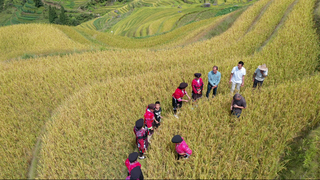Longsheng Producers Cooperatives (co-ops).
What are they and how does Viori support them?

Why co-ops?
One of the biggest challenges of rural communities is their lack of 'market-power'. What is meant by this is their inability to compete with larger scale producers that are able to create economies of scale due to advantages in funds, efficient managements, geographical advantages, and more.
Villages consists of many different families which function as a large group of individual producers that aren't operating as one unit.

Being individual producers means separately buying equipment & raw materials; separately producing the product (eg: agricultural crops, local crafts, wood ,bamboo, etc); In short, the planting, growing, harvesting, producing, packaging, distribution, administration, isn't done by one unit, but by many individual producers separately.
This set-up might works if the producer is totally self-sustaining and not in need of additional revenue streams. However due to economic pressures, this often isn't the case which is why they are required to produce and sell their products.
The solution
Farmers cooperatives can be seen as small scale businesses formed by a group of individual farmers (members) that pool their resources so they can operate as one unit. By operating as one unit they are able to save money by sharing resources (equipment, labor) together with enjoying other benefiting like (eg: trainings, market insights, new technologies, and more). This can be a potentially big step in the development of a community.

So what is holding them back?
Our research and on-the-ground presence in Longsheng provides us with several reasons:
-
Funding
Despite being designed to lower costs in the long run, the biggest bottleneck in setting up co-ops is often the upfront financial commitment member must take on. Just like getting a company registered and up-and-running, a co-op too requires upfront costs such as: registration costs, accounting costs, other operations costs, travel costs and more. For farmers which already face economic pressures these relatively small costs add up.
-
Illiteracy (Language and Admin)
Many farmers only have very basic reading and writing skills, making application forms and handling the co-op's administration a challenging task.
-
Hesitant to change
Working as a unit usually means adopting a new style of working and new ways of thinking which can be a hurdle for some locals. The person introducing the co-ops needs to be professional and possess strong leadership skills in order to bring individual members together and communicate clearly the pro's and con's of setting up a co-op so that members can make informed decisions.
Which local co-ops does Viori support?
- In February 2021 Viori helped establish the first local co-op of Longji village (one of the villages we work in). The 7 Red Yao women involved in the embroidery project required an official entity in order for us to help them in their desire to grown their embroidery business. Due to the challenges mentioned above they requested our support.

- In the beginning of this year (2022) we helped establish another local co-op in the village of Yujia with the rice farmers. This brings the farmers one important step closer to not only officially securing their partnership with Viori (we officially only can sign partnership agreements with entities instead of individuals), but also allowing them better market access for their rice. Moreover it will help in applying for their rice's organic certification.

How exactly does Viori support the co-ops?
- Funding: Viori provides funding to get the co-op registered and to cover operating costs (see Impact report for an overview of costs involved) for the first years until the co-op becomes self-sustaining.
- Admin Training: Additionally, Viori provided training to co-op members to help them become more literate in accounting and legal issues regarding the co-op.
- Technical Training:
1. On request, the Red Yao women of the embroidery project are working together with designers brought in by Viori to ensure that their hand-made ornaments both suit the needs of consumers, while simultaneously preserving their unique embroidery tradition.
2. The rice farmers are receiving training by professional 'all-natural farming' experts. All-natural farming is a stream within farming which includes organic farming, but goes on step further by only growing traditional seed varieties (heirloom) and prohibiting the use of any type of fertilizer (even organic fertilizers). This method sounds deceivingly simple. However, by not relying on any 'external support' (eg: pesticides, fertilizers), the farmers require a new set of skills. Ironically, the skills that their ancestors often possessed.

Does Viori itself have ownership in the local co-ops?
- Viori does not have any ownership in any of the local co-ops. In line with the philosophy behind co-ops (namely to empower small-scale producers themselves to strengthen their decision-making power and market position), the local co-ops only consist only of village members. Due to Viori's Beautiful Reason Initiative we are able to provide financial and training support without requiring any involvement. We do work actively with the key decision makers within the co-ops in a consultancy type role, to ensure efficiency and fairness of practices.
We hope this has shed some light on what co-ops are; how they can benefit the local economy and what role Viori plays in the establishment of these co-ops.
Do you have any questions about our work in Longsheng? Be sure to contact us at socialresponsibility@viori.com We're happy to answer any of your questions!

